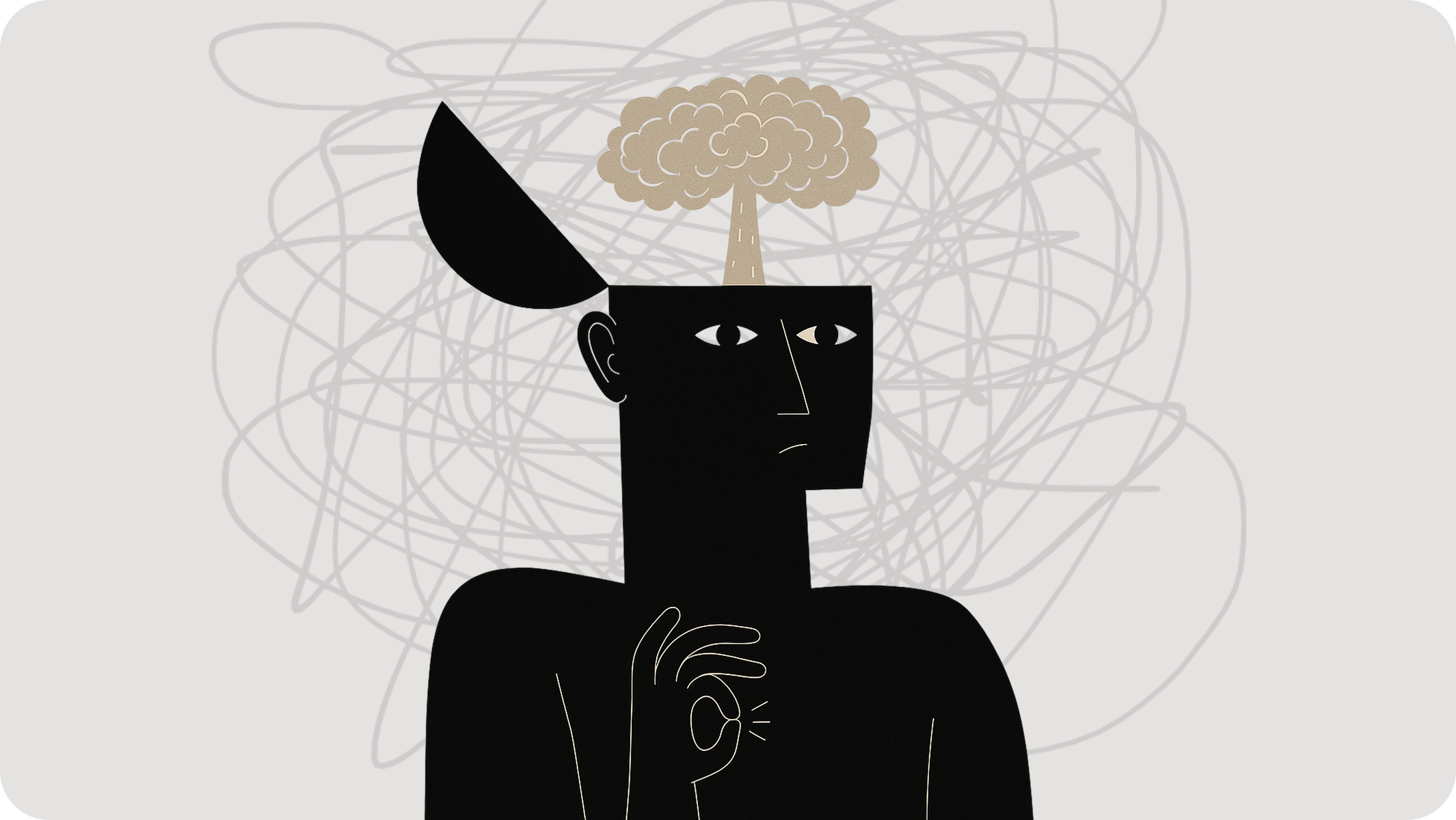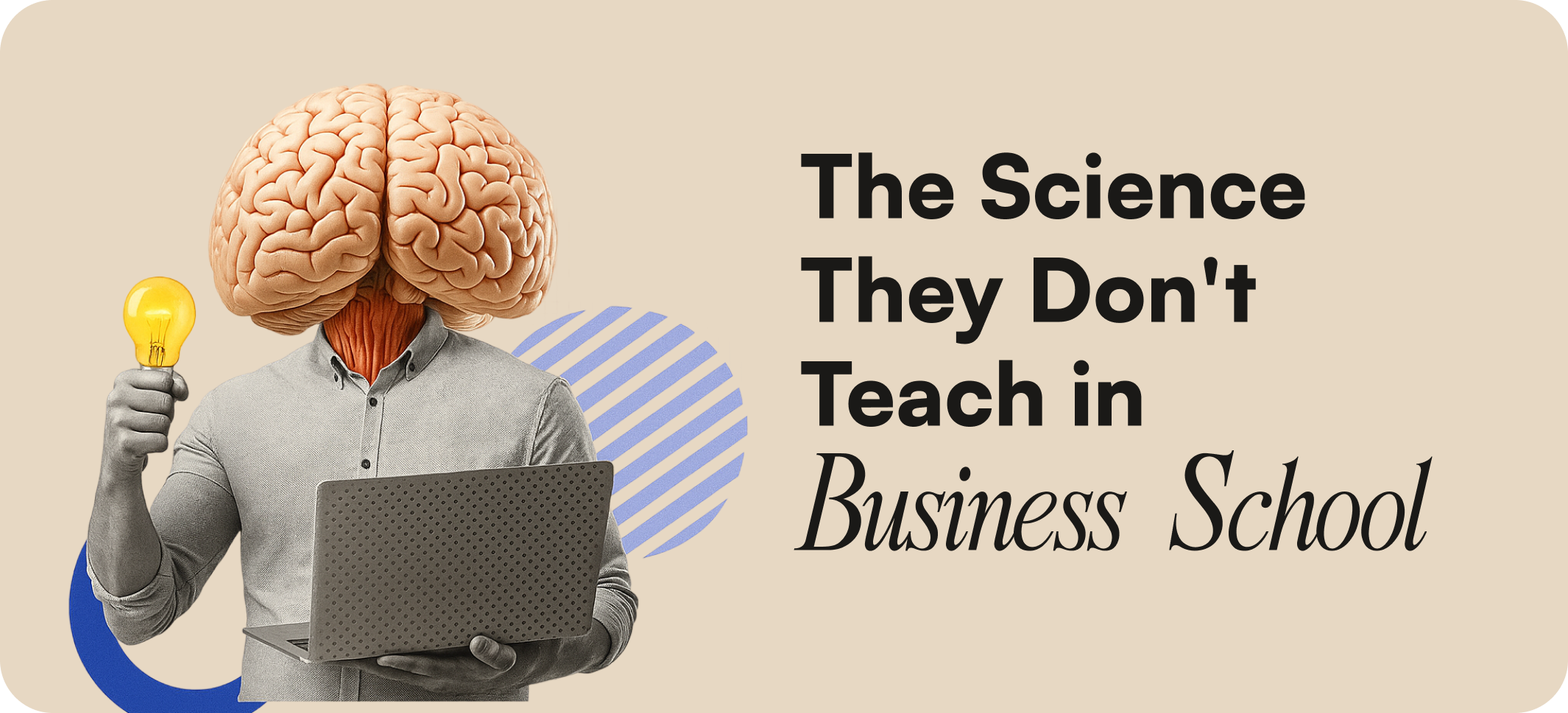
Research shows that a leader’s mood accounts for 50-70% of a company’s emotional climate, and successful entrepreneurs like Alex Hormozi utilise it as emotional capital.
Mood is the magnet that shapes your sphere of influence. Moreso for a startup leader battling emotions, numbers, and deadlines. Imagine the startup landscape to be a battlefield and the leader as the war general whose ability to motivate troops decides the outcome of the war. I can claim this from the vantage point of having won one such battle at CreditVidya. But how?
After the Covid lockdown, when startup journalists had written off fintech lending startups, our story was no different. We all had taken salary cuts. Everyone was hanging on to my conversations with VCs, hoping something would materialise. Each "no" had chipped away another piece of my enthusiasm, and the uncertainty was eating away at my life. Yet there I was, smiling, pretending that rejection was nowhere around me. I survived the phase, and therefore, my team survived as well. That’s because my team's productivity was directly tied to my ability to manage my internal state, my mood, my emotional state. Science calls it “emotional contagion,” and research shows leader mood shapes 50-70% of a company’s emotional climate.
Therefore, your real competitive advantage lies in the energy you bring into every interaction, the confidence you radiate when everything's falling apart, the calm you maintain when the whole world seems to be betting against you. And this depends on your mood. Most leaders think mood is a reaction to a situation and therefore random. In reality, it is shaped by a range of biological, psychological, and environmental factors, and in turn, it has a broad impact on cognition, behaviour, health, social and professional life.

Being A Leader Is A Privilege, But Of Responsibility
True, leadership is a privilege, but the privilege isn’t about calling the shots or crafting strategy. It means soaking up uncertainty, pressure, and external chaos so your team can stay focused, creative, and safe enough to take risks. Most businesses have to evolve until they find the right product-market fit, and the intervening uncertainty is brutal. To weather that uncertainty, your job is to let your team borrow your calm and conviction. Their morale lives (or dies) on your self-regulation and mastery of your internal emotions.
Your people read everything: Eye contact, energy, posture, tone of voice, even the footsteps as you enter a room. Are you radiating confidence, or telegraphing anxiety? Your micro-signals answer the unspoken team question: “Are we really going to make it?”
So, regardless of how hard it sounds, you have to develop what I call the **superpower to be in a good mood**. Not fake positivity or toxic optimism, but genuine ability to regulate your internal state so you can show up as the leader your team needs, especially when everything appears to be falling apart.

For 200,000 years, humans survived by instantly reading their leader's emotional state. Calm leader? Safe. Anxious leader? Danger everywhere. Those same neural pathways are firing in your Monday morning standups. MIT and Stanford researchers documented exactly how this works: Team members unconsciously mirror your facial expressions, vocal tone, and body language within minutes. They're not just hearing your words but absorbing the state of your nervous system. More importantly, negative emotions are way more contagious than positive ones. Your bad day becomes everyone's bad day.
American entrepreneur and investor Alex Hormozi is often quoted: "The single greatest skill that you can develop is being in a good mood in the absence of things to be in a great mood about." Author Wayne Dyer sums it up by stating that if you change the way you look at things, the things you look at change. This is what makes mood the emotional capital and seed investment for any venture.
Numbers
don't lie:
Yale studies show emotionally regulated leaders see 10-30% improvements in team output. Teams with high emotional energy are 31% more productive. Even a modest 5% efficiency boost from your emotional regulation equals an extra month of work per employee annually.
Here's what's crazy about this:
Elite athletes have entire teams dedicated to managing their internal state. From pre-game routines to biometric monitoring, recovery protocols, and mental preparation, everything is designed to ensure they show up in optimal condition when it matters. Navy SEALs train emotional regulation as rigorously as they train marksmanship because they know that under pressure, your internal state determines whether you execute or freeze. But business founders, who influence way more people and make way bigger decisions, just wing it. We rely on coffee and willpower. We treat our mood like the weather that just happens to us.
Startup culture, in fact, celebrates this destruction, glorifying the grinding exhaustion that comes with raising a company. But if leadership is actually about caring for your team's success and your company's survival, you would act more responsibly.
At CV, I didn't have the luxury of being a successful founder. It was do or die. So I started experimenting. I stopped acting tough and started caring about what actually mattered: Keeping my team together and keeping the company alive.
The Formula That Changed Everything
I tracked my mood like any other business metric. Simple experiment: Log my mood every morning, track my actions throughout the day with bio-sensors. After months of data, I discovered something obvious - mood isn't random. It's predictable and can be managed.
Mood = Yesterday's Momentum + Glucose Stability + Sleep Quality + Information Diet + People Diet + Response Pattern + Random Chaos
Yesterday's Momentum:
Your emotional state compounds. Good days build momentum. Bad days create drag that follows you like a shadow. Yesterday's energy becomes today's starting point, whether you realise it or not.
Sleep Quality:
Matt Walker's research shows that one hour of sleep debt equals cognitive impairment of being drunk. Yet we show up to lead teams and make million-dollar decisions running on four hours of sleep like it's a badge of honour. Your team deserves better than a drunk leader. Studies show that during REM (rapid eye movement) sleep, the brain processes and organises emotions, helping you deal with stress and challenges.
Glucose Stability:
We're drowning in glucose traps. Vending machine "healthy" snacks, breakfast pastries, and afternoon crashes from whatever sugar bomb you grabbed. Each spike creates an inevitable crash that turns you into an irritable, poor decision-making version of yourself. Your afternoon mood isn't your personality; it's your blood sugar. Eating tryptophan-rich foods (nuts, seeds), along with vitamins B6, B12, and folate, supports healthy neurotransmitter production and boosts mood.
Physical Habits:
Deep breathing releases endorphins, provides natural pain relief, and improves oxygen flow, thus balancing emotions. The brain responds physiologically to sound; forest sounds calm the amygdala, reducing anxiety.
Information Diet:
Media companies weaponise fear to steal your attention. Every notification, headline, and doom-scroll session programs your nervous system for anxiety. We walk around in constant fight-or-flight mode, wondering why we feel terrible. Your information diet is as important as your food diet.
People Diet:
Some people are emotional black holes. Chronic complainers who never solve problems, pessimists who drain energy from every room they enter. You know who they are. Cut them out. Your emotional bandwidth is finite; stop letting energy vampires feast on it.
Response Pattern:
We've lost the ability to sit still. Everything is stimulus, reaction, dopamine hit, repeat. That angry email you fired off? That defensive response in the meeting? That's your hijacked nervous system, not strategic thinking. How you frame setbacks as personal flaws or learning opportunities determines whether you spiral or grow.
Random Chaos:
Life throws curveballs: Difficult calls, tense meetings, family drama you can't avoid. You can't eliminate chaos, but you can build enough buffers in other variables so that random events don't destroy your entire state.
After months of testing, I built routines that worked around these factors. People called my discipline boring. They didn't realise it was the biggest productivity hack for my team.
Here's what actually happened: We successfully pivoted from B2B SaaS to embedded lending with very little cash in the bank account … (how I did it is a story for another time). The transformation didn't start with a brilliant strategy but with a simple admission of taking responsibility for the energy I brought to my team every day.

Your Move: Treat Your Mood As Strategy
Ever notice that senior leaders are genuinely energising to be around? In their presence, you feel capable of more than you thought possible. It's not natural charisma. They figured out that their emotional state is an amplifier, and they treat it like one. They understand the invisible variable that either unlocks their team's potential or sabotages it.
With the odds stacked against you, why leave anything to chance?
Track your mood. Audit your energy rituals. Build the self-mastery your company will need when the next storm hits. The mood you set is not random, and it is never irrelevant.
It is your most defensible competitive advantage. Arm yourself with emotional intelligence to win the motivation battle before the product war.
Research shows that a leader’s mood accounts for 50-70% of a company’s emotional climate, and successful entrepreneurs like Alex Hormozi utilise it as emotional capital.
Mood is the magnet that shapes your sphere of influence. Moreso for a startup leader battling emotions, numbers, and deadlines. Imagine the startup landscape to be a battlefield and the leader as the war general whose ability to motivate troops decides the outcome of the war. I can claim this from the vantage point of having won one such battle at CreditVidya. But how?
After the Covid lockdown, when startup journalists had written off fintech lending startups, our story was no different. We all had taken salary cuts. Everyone was hanging on to my conversations with VCs, hoping something would materialise. Each "no" had chipped away another piece of my enthusiasm, and the uncertainty was eating away at my life. Yet there I was, smiling, pretending that rejection was nowhere around me. I survived the phase, and therefore, my team survived as well. That’s because my team's productivity was directly tied to my ability to manage my internal state, my mood, my emotional state. Science calls it “emotional contagion,” and research shows leader mood shapes 50-70% of a company’s emotional climate.
Therefore, your real competitive advantage lies in the energy you bring into every interaction, the confidence you radiate when everything's falling apart, the calm you maintain when the whole world seems to be betting against you. And this depends on your mood. Most leaders think mood is a reaction to a situation and therefore random. In reality, it is shaped by a range of biological, psychological, and environmental factors, and in turn, it has a broad impact on cognition, behaviour, health, social and professional life.

Being A Leader Is A Privilege, But Of Responsibility
True, leadership is a privilege, but the privilege isn’t about calling the shots or crafting strategy. It means soaking up uncertainty, pressure, and external chaos so your team can stay focused, creative, and safe enough to take risks. Most businesses have to evolve until they find the right product-market fit, and the intervening uncertainty is brutal. To weather that uncertainty, your job is to let your team borrow your calm and conviction. Their morale lives (or dies) on your self-regulation and mastery of your internal emotions.
Your people read everything: Eye contact, energy, posture, tone of voice, even the footsteps as you enter a room. Are you radiating confidence, or telegraphing anxiety? Your micro-signals answer the unspoken team question: “Are we really going to make it?”
So, regardless of how hard it sounds, you have to develop what I call the **superpower to be in a good mood**. Not fake positivity or toxic optimism, but genuine ability to regulate your internal state so you can show up as the leader your team needs, especially when everything appears to be falling apart.

For 200,000 years, humans survived by instantly reading their leader's emotional state. Calm leader? Safe. Anxious leader? Danger everywhere. Those same neural pathways are firing in your Monday morning standups. MIT and Stanford researchers documented exactly how this works: Team members unconsciously mirror your facial expressions, vocal tone, and body language within minutes. They're not just hearing your words but absorbing the state of your nervous system. More importantly, negative emotions are way more contagious than positive ones. Your bad day becomes everyone's bad day.
American entrepreneur and investor Alex Hormozi is often quoted: "The single greatest skill that you can develop is being in a good mood in the absence of things to be in a great mood about." Author Wayne Dyer sums it up by stating that if you change the way you look at things, the things you look at change. This is what makes mood the emotional capital and seed investment for any venture.
Numbers
don't lie:
Yale studies show emotionally regulated leaders see 10-30% improvements in team output. Teams with high emotional energy are 31% more productive. Even a modest 5% efficiency boost from your emotional regulation equals an extra month of work per employee annually.
Here's what's crazy about this:
Elite athletes have entire teams dedicated to managing their internal state. From pre-game routines to biometric monitoring, recovery protocols, and mental preparation, everything is designed to ensure they show up in optimal condition when it matters. Navy SEALs train emotional regulation as rigorously as they train marksmanship because they know that under pressure, your internal state determines whether you execute or freeze. But business founders, who influence way more people and make way bigger decisions, just wing it. We rely on coffee and willpower. We treat our mood like the weather that just happens to us.
Startup culture, in fact, celebrates this destruction, glorifying the grinding exhaustion that comes with raising a company. But if leadership is actually about caring for your team's success and your company's survival, you would act more responsibly.
At CV, I didn't have the luxury of being a successful founder. It was do or die. So I started experimenting. I stopped acting tough and started caring about what actually mattered: Keeping my team together and keeping the company alive.
The Formula That Changed Everything
I tracked my mood like any other business metric. Simple experiment: Log my mood every morning, track my actions throughout the day with bio-sensors. After months of data, I discovered something obvious - mood isn't random. It's predictable and can be managed.
Mood = Yesterday's Momentum + Glucose Stability + Sleep Quality + Information Diet + People Diet + Response Pattern + Random Chaos
Yesterday's Momentum:
Your emotional state compounds. Good days build momentum. Bad days create drag that follows you like a shadow. Yesterday's energy becomes today's starting point, whether you realise it or not.
Sleep Quality:
Matt Walker's research shows that one hour of sleep debt equals cognitive impairment of being drunk. Yet we show up to lead teams and make million-dollar decisions running on four hours of sleep like it's a badge of honour. Your team deserves better than a drunk leader. Studies show that during REM (rapid eye movement) sleep, the brain processes and organises emotions, helping you deal with stress and challenges.
Glucose Stability:
We're drowning in glucose traps. Vending machine "healthy" snacks, breakfast pastries, and afternoon crashes from whatever sugar bomb you grabbed. Each spike creates an inevitable crash that turns you into an irritable, poor decision-making version of yourself. Your afternoon mood isn't your personality; it's your blood sugar. Eating tryptophan-rich foods (nuts, seeds), along with vitamins B6, B12, and folate, supports healthy neurotransmitter production and boosts mood.
Physical Habits:
Deep breathing releases endorphins, provides natural pain relief, and improves oxygen flow, thus balancing emotions. The brain responds physiologically to sound; forest sounds calm the amygdala, reducing anxiety.
Information Diet:
Media companies weaponise fear to steal your attention. Every notification, headline, and doom-scroll session programs your nervous system for anxiety. We walk around in constant fight-or-flight mode, wondering why we feel terrible. Your information diet is as important as your food diet.
People Diet:
Some people are emotional black holes. Chronic complainers who never solve problems, pessimists who drain energy from every room they enter. You know who they are. Cut them out. Your emotional bandwidth is finite; stop letting energy vampires feast on it.
Response Pattern:
We've lost the ability to sit still. Everything is stimulus, reaction, dopamine hit, repeat. That angry email you fired off? That defensive response in the meeting? That's your hijacked nervous system, not strategic thinking. How you frame setbacks as personal flaws or learning opportunities determines whether you spiral or grow.
Random Chaos:
Life throws curveballs: Difficult calls, tense meetings, family drama you can't avoid. You can't eliminate chaos, but you can build enough buffers in other variables so that random events don't destroy your entire state.
After months of testing, I built routines that worked around these factors. People called my discipline boring. They didn't realise it was the biggest productivity hack for my team.
Here's what actually happened: We successfully pivoted from B2B SaaS to embedded lending with very little cash in the bank account … (how I did it is a story for another time). The transformation didn't start with a brilliant strategy but with a simple admission of taking responsibility for the energy I brought to my team every day.

Your Move: Treat Your Mood As Strategy
Ever notice that senior leaders are genuinely energising to be around? In their presence, you feel capable of more than you thought possible. It's not natural charisma. They figured out that their emotional state is an amplifier, and they treat it like one. They understand the invisible variable that either unlocks their team's potential or sabotages it.
With the odds stacked against you, why leave anything to chance?
Track your mood. Audit your energy rituals. Build the self-mastery your company will need when the next storm hits. The mood you set is not random, and it is never irrelevant.
It is your most defensible competitive advantage. Arm yourself with emotional intelligence to win the motivation battle before the product war.

Research shows that a leader’s mood accounts for 50-70% of a company’s emotional climate, and successful entrepreneurs like Alex Hormozi utilise it as emotional capital.
Mood is the magnet that shapes your sphere of influence. Moreso for a startup leader battling emotions, numbers, and deadlines. Imagine the startup landscape to be a battlefield and the leader as the war general whose ability to motivate troops decides the outcome of the war. I can claim this from the vantage point of having won one such battle at CreditVidya. But how?
After the Covid lockdown, when startup journalists had written off fintech lending startups, our story was no different. We all had taken salary cuts. Everyone was hanging on to my conversations with VCs, hoping something would materialise. Each "no" had chipped away another piece of my enthusiasm, and the uncertainty was eating away at my life. Yet there I was, smiling, pretending that rejection was nowhere around me. I survived the phase, and therefore, my team survived as well. That’s because my team's productivity was directly tied to my ability to manage my internal state, my mood, my emotional state. Science calls it “emotional contagion,” and research shows leader mood shapes 50-70% of a company’s emotional climate.
Therefore, your real competitive advantage lies in the energy you bring into every interaction, the confidence you radiate when everything's falling apart, the calm you maintain when the whole world seems to be betting against you. And this depends on your mood. Most leaders think mood is a reaction to a situation and therefore random. In reality, it is shaped by a range of biological, psychological, and environmental factors, and in turn, it has a broad impact on cognition, behaviour, health, social and professional life.

Being A Leader Is A Privilege, But Of Responsibility
True, leadership is a privilege, but the privilege isn’t about calling the shots or crafting strategy. It means soaking up uncertainty, pressure, and external chaos so your team can stay focused, creative, and safe enough to take risks. Most businesses have to evolve until they find the right product-market fit, and the intervening uncertainty is brutal. To weather that uncertainty, your job is to let your team borrow your calm and conviction. Their morale lives (or dies) on your self-regulation and mastery of your internal emotions.
Your people read everything: Eye contact, energy, posture, tone of voice, even the footsteps as you enter a room. Are you radiating confidence, or telegraphing anxiety? Your micro-signals answer the unspoken team question: “Are we really going to make it?”
So, regardless of how hard it sounds, you have to develop what I call the **superpower to be in a good mood**. Not fake positivity or toxic optimism, but genuine ability to regulate your internal state so you can show up as the leader your team needs, especially when everything appears to be falling apart.

For 200,000 years, humans survived by instantly reading their leader's emotional state. Calm leader? Safe. Anxious leader? Danger everywhere. Those same neural pathways are firing in your Monday morning standups. MIT and Stanford researchers documented exactly how this works: Team members unconsciously mirror your facial expressions, vocal tone, and body language within minutes. They're not just hearing your words but absorbing the state of your nervous system. More importantly, negative emotions are way more contagious than positive ones. Your bad day becomes everyone's bad day.
American entrepreneur and investor Alex Hormozi is often quoted: "The single greatest skill that you can develop is being in a good mood in the absence of things to be in a great mood about." Author Wayne Dyer sums it up by stating that if you change the way you look at things, the things you look at change. This is what makes mood the emotional capital and seed investment for any venture.
Numbers
don't lie:
Yale studies show emotionally regulated leaders see 10-30% improvements in team output. Teams with high emotional energy are 31% more productive. Even a modest 5% efficiency boost from your emotional regulation equals an extra month of work per employee annually.
Here's what's crazy about this:
Elite athletes have entire teams dedicated to managing their internal state. From pre-game routines to biometric monitoring, recovery protocols, and mental preparation, everything is designed to ensure they show up in optimal condition when it matters. Navy SEALs train emotional regulation as rigorously as they train marksmanship because they know that under pressure, your internal state determines whether you execute or freeze. But business founders, who influence way more people and make way bigger decisions, just wing it. We rely on coffee and willpower. We treat our mood like the weather that just happens to us.
Startup culture, in fact, celebrates this destruction, glorifying the grinding exhaustion that comes with raising a company. But if leadership is actually about caring for your team's success and your company's survival, you would act more responsibly.
At CV, I didn't have the luxury of being a successful founder. It was do or die. So I started experimenting. I stopped acting tough and started caring about what actually mattered: Keeping my team together and keeping the company alive.
The Formula That Changed Everything
I tracked my mood like any other business metric. Simple experiment: Log my mood every morning, track my actions throughout the day with bio-sensors. After months of data, I discovered something obvious - mood isn't random. It's predictable and can be managed.
Mood = Yesterday's Momentum + Glucose Stability + Sleep Quality + Information Diet + People Diet + Response Pattern + Random Chaos
Yesterday's Momentum:
Your emotional state compounds. Good days build momentum. Bad days create drag that follows you like a shadow. Yesterday's energy becomes today's starting point, whether you realise it or not.
Sleep Quality:
Matt Walker's research shows that one hour of sleep debt equals cognitive impairment of being drunk. Yet we show up to lead teams and make million-dollar decisions running on four hours of sleep like it's a badge of honour. Your team deserves better than a drunk leader. Studies show that during REM (rapid eye movement) sleep, the brain processes and organises emotions, helping you deal with stress and challenges.
Glucose Stability:
We're drowning in glucose traps. Vending machine "healthy" snacks, breakfast pastries, and afternoon crashes from whatever sugar bomb you grabbed. Each spike creates an inevitable crash that turns you into an irritable, poor decision-making version of yourself. Your afternoon mood isn't your personality; it's your blood sugar. Eating tryptophan-rich foods (nuts, seeds), along with vitamins B6, B12, and folate, supports healthy neurotransmitter production and boosts mood.
Physical Habits:
Deep breathing releases endorphins, provides natural pain relief, and improves oxygen flow, thus balancing emotions. The brain responds physiologically to sound; forest sounds calm the amygdala, reducing anxiety.
Information Diet:
Media companies weaponise fear to steal your attention. Every notification, headline, and doom-scroll session programs your nervous system for anxiety. We walk around in constant fight-or-flight mode, wondering why we feel terrible. Your information diet is as important as your food diet.
People Diet:
Some people are emotional black holes. Chronic complainers who never solve problems, pessimists who drain energy from every room they enter. You know who they are. Cut them out. Your emotional bandwidth is finite; stop letting energy vampires feast on it.
Response Pattern:
We've lost the ability to sit still. Everything is stimulus, reaction, dopamine hit, repeat. That angry email you fired off? That defensive response in the meeting? That's your hijacked nervous system, not strategic thinking. How you frame setbacks as personal flaws or learning opportunities determines whether you spiral or grow.
Random Chaos:
Life throws curveballs: Difficult calls, tense meetings, family drama you can't avoid. You can't eliminate chaos, but you can build enough buffers in other variables so that random events don't destroy your entire state.
After months of testing, I built routines that worked around these factors. People called my discipline boring. They didn't realise it was the biggest productivity hack for my team.
Here's what actually happened: We successfully pivoted from B2B SaaS to embedded lending with very little cash in the bank account … (how I did it is a story for another time). The transformation didn't start with a brilliant strategy but with a simple admission of taking responsibility for the energy I brought to my team every day.

Your Move: Treat Your Mood As Strategy
Ever notice that senior leaders are genuinely energising to be around? In their presence, you feel capable of more than you thought possible. It's not natural charisma. They figured out that their emotional state is an amplifier, and they treat it like one. They understand the invisible variable that either unlocks their team's potential or sabotages it.
With the odds stacked against you, why leave anything to chance?
Track your mood. Audit your energy rituals. Build the self-mastery your company will need when the next storm hits. The mood you set is not random, and it is never irrelevant.
It is your most defensible competitive advantage. Arm yourself with emotional intelligence to win the motivation battle before the product war.

Resonating with this philosophy?
Join the smartest founders mastering the inner game to face the unknown. Read by YC & Sequoia.



To be continued…
A small favor...
I don't run ads. If this brought clarity, the biggest favor you can do is subscribe below.




.svg)

.svg)

